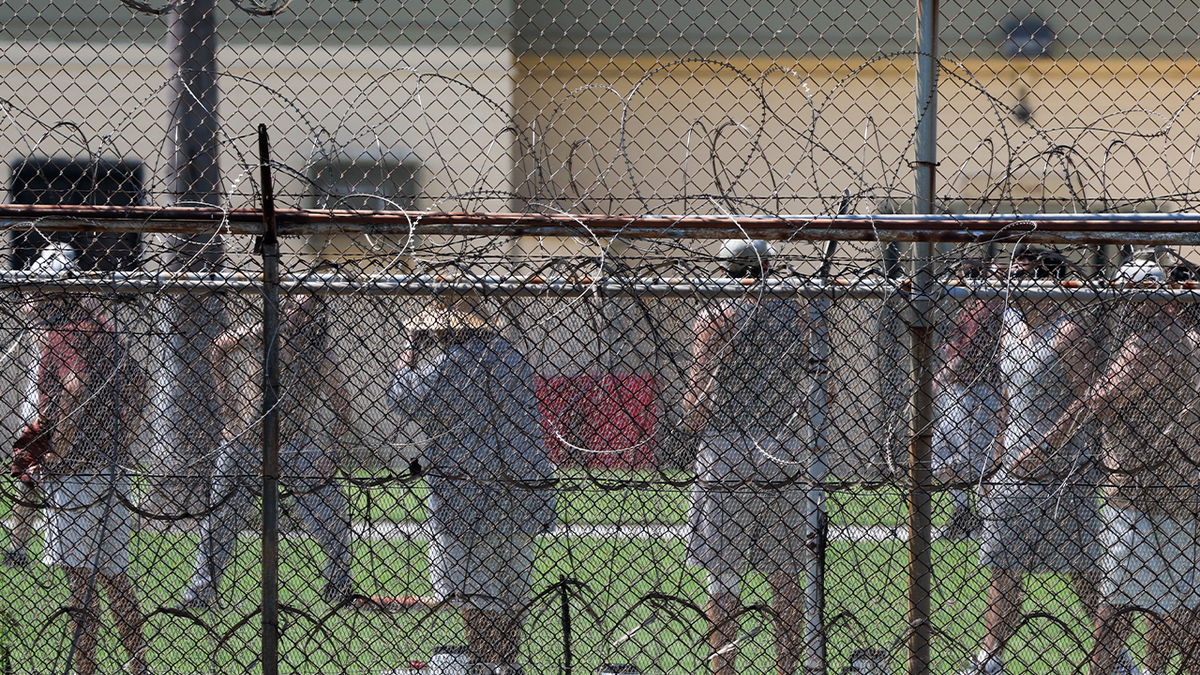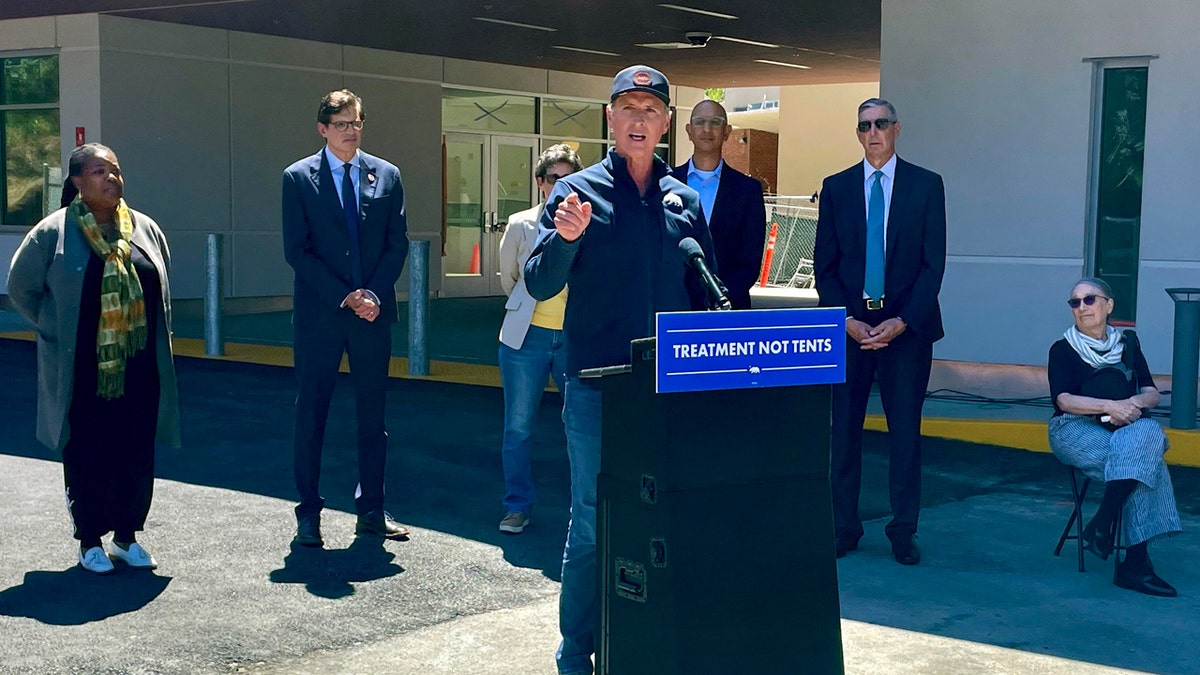Share this @internewscast.com
In California, a law designed to divert individuals with mental health issues from incarceration is now facing criticism for allowing violent offenders and repeat criminals to evade justice, according to Sacramento County Sheriff Jim Cooper. He described the policy as “terrible” and accused “career criminals” of exploiting it.
Sheriff Cooper expressed to Fox News Digital that the current legal framework has replaced accountability with mere “excuses,” criticizing what he referred to as “terrible laws.”
“There is indeed a place for diversion, particularly for those struggling with addiction,” Cooper noted. “However, the system has been opened too widely. Now, many, especially criminals, are exploiting it. It’s a system being heavily abused, and that’s the unfortunate reality.”
Taking to social media last week, Cooper aired his concerns about state diversion policies on the department’s official Facebook page. He asserted that “career criminals” were using mental health as a means to dodge accountability.

Inmates are seen gathered in a recreational area behind security barriers at the Federal Correctional Institution (FCI) Terminal Island, a low-security prison for men under the management of the Federal Bureau of Prisons, located at the entrance to the Port of Los Angeles on September 13, 2025. (Patrick T. Fallon / AFP via Getty Images)
The mental health diversion law in California, enacted in 2018 through AB 1810 and SB 215, allows defendants to put their criminal proceedings on hold while they participate in a court-sanctioned treatment program as an alternative to imprisonment.
If they complete treatment successfully, their charges are dismissed and their record is wiped clean, Cooper explained.
The law was designed to help people whose mental illness contributed to their crimes get treatment rather than punishment.
But it goes much further than many realize.
Only a few crimes are excluded – murder, voluntary manslaughter, rape and sex crimes requiring registration. Everything else, from child abuse to armed robbery, can qualify for diversion.
Even the list of mental health conditions that count toward eligibility is broad.
According to the state’s own guidelines, nearly any diagnosis listed in the DSM-5, the manual doctors used to define mental disorders, can qualify.

California Gov. Gavin Newsom makes an announcement on Tuesday, May 14, 2024, in San Mateo, Calif. Hammered by mounting pressure to address the growing homelessness crisis in California, Newsom announced that his administration was making $3.3 billion available ahead of schedule for counties and private developers to start building more behavioral health treatment centers as part of his efforts to fund housing and drug use programs. (AP Photo/Haven Daley)
The only exceptions are borderline personality disorder, antisocial personality disorder and pedophilia.
Lawmakers have tried to tighten those rules.
Assembly Bill 433, introduced by Assemblymember Maggy Krell, would prevent defendants charged with child abuse, endangerment or serious injury crimes from being diverted.
Cooper’s office called it “a big step in the right direction, but much is left to be done.”
Cooper said some of the most shocking crimes he’s seen in decades are now being swept into California’s mental health diversion system, including cases where babies were tortured or killed, and the suspects still qualified for diversion instead of prison.
“If you beat your kid to death, you should not be around kids,” Cooper said. “When he got diversion, it erased his record… He can be a teacher, a coach — and that’s scary.”
According to the Sacramento County Sheriff’s Office, recent cases include:
- A 1-year-old baby girl was beaten to death by her father, who admitted drinking heavily but was granted diversion.
- A 20-month-old boy who died with 49 injuries after being battered by his parents, who applied for diversion.
- A toddler caught on video being smothered and punched by her father, while her mother — deployed out of state — watched the abuse on her phone. Both parents remain eligible.
- A 3-year-old boy overdosed on prescription Lithium allegedly force-fed by his caretakers; both were granted diversion and avoided child-abuse charges.
Cooper said those cases show how the law has gone far beyond its original intent, with the current system leaving judges with no flexibility.
“We’ve seen some horrific cases here in Sacramento and really across the state of California,” he said. “It ties the judges’ hands… they don’t have a choice to grant diversion.”
According to the Sheriff’s Office, brothers Adam and Juan Velasquez, both known as Howe Park Sureño gang members, were convicted of violently attacking an innocent man in an unprovoked assault. Deputies said the victim was blindsided, knocked unconscious and seriously injured simply because the suspects perceived him as a rival.

The Sacramento County Sheriff’s Office announced that two brothers and known Howe Park Sureno gang members, Adam and Juan Velasquez, were convicted of violently attacking an innocent man in an unprovoked assault. (Sacramento County Sheriff’s Office)
While both were arrested for felonies, officials noted that Juan Velasquez was granted mental health diversion instead of serving jail time.
In May, while out on probation, the brothers allegedly struck again. The sheriff’s office said they confronted another man who was dining with his family at a restaurant, shouted gang slurs, tried to assault and stab the victim with a knife, and then slashed his tires before fleeing.
The victim again had no gang affiliation. Deputies arrested Adam Velasquez in August, and Juan Velasquez was located and arrested later by the sheriff’s gang detectives.
“These bad guys know there is zero accountability… They talk about it in our jails. We’ve got them on record talking about mental health diversion — how to exploit it and get out of their cases,” Cooper said.
In another example cited by the Sheriff’s Office, 44-year-old Darren Campoy was arrested this month by robbery detectives outside his Roseville home. Deputies said Campoy had robbed the Sacramento Credit Union on Oct. 15, 2025, handing a teller a note demanding cash and walking out with $2,460.
Repeat offender Darren Campoy was caught on camera robbing a Sacramento Credit Union — less than a year after being granted mental health diversion for a previous bank robbery, according to the sheriff’s office. (Sacramento County Sheriff’s Office)
According to the sheriff’s post, Campoy was already on Post-Release Community Supervision (PRCS) from Placer County for a 2021 bank robbery. Earlier this year, he was granted mental health diversion, which Cooper said erased his criminal proceedings so that he could receive “treatment” instead of jail time.
“If they complete treatment successfully, their charges are dismissed,” Cooper said, calling it a process that “effectively erases the defendant’s record.”

Sacramento County officials said Darren Campoy is another example of a mental health diversion failure after he was arrested again. (Sacramento County Sheriff’s Office)
Despite a long criminal record, including armed robbery, reckless driving and evading police, and what psychologists reportedly described as a “higher risk to public safety,” Campoy was released. Less than a year later, deputies said, he robbed a bank again.
“Less than a year later, he’s back to robbing banks. That’s a result of terrible laws. And it’s exactly what happens when accountability gets replaced with excuses,” the sheriff’s office wrote.
Cooper said the current system has created a revolving door that puts the public at risk.
“People need to be held accountable when they commit these types of crimes. Right now, anyone in jail, anyone and everyone are basically applying for mental health diversion and a lot of them are getting it because in the court system, it ties their hands,” he continued.
He added that his deputies routinely see suspects discussing how to claim mental health conditions after the fact to qualify for leniency.
“It really makes it harder to do your job. And these bad guys know there is zero accountability that they can get away with these crimes, nothing’s gonna happen.”
When reached for comment, a spokesperson for Gov. Gavin Newsom told Fox News Digital that the state’s diversion policy is determined by the courts, not the governor.
“Under Penal Code section 1001.36, the decision to refer a defendant to mental health diversion is solely within a judge’s discretion,” the spokesperson said. “The governor does not review individual cases and cannot determine whether repeat offenders should be admitted — that is up to the judge hearing the case.”
The spokesperson added that Newsom “is committed to effective public safety,” and said the purpose of the diversion law is to ensure that “when people who commit crimes because of a mental health disorder receive necessary treatment, the public is safer.”
“That is the heart of the mental health diversion statute,” the spokesperson said, adding that the governor “would take into consideration any bill that lands on his desk.”
Newsom’s office also noted that several serious offenses are not eligible for diversion under state law, including murder, voluntary manslaughter, rape, child sexual abuse and crimes involving weapons of mass destruction or DUI offenses.
The sheriff said he plans to keep pushing for reform when the Legislature reconvenes next year.
“We’ll be back in January and battle this bill that’s pending to make diversion even more widespread,” Cooper said.
And until the law changes, Cooper said, his department will keep exposing the cases that highlight what he calls a “broken system.”
“We’re gonna hold folks accountable as much as we can,” he said. “When it goes awry, we’re gonna let you know about it and we’re not going to sit on it.”
California’s mental health diversion law (AB 1810) allows certain defendants to pause criminal proceedings and enter treatment instead of serving jail time, with charges dismissed upon successful completion. Lawmakers intended the policy to reduce incarceration among people whose mental illness contributed to their crimes.
“The idea behind diversion laws was to help those who commit low-level crimes because of treatable mental illness,” the sheriff’s office wrote. “But what we have now are career criminals using ‘mental health’ as a shield to avoid consequences – and this is the result.”
Stepheny Price covers crime, including missing persons, homicides and migrant crime. Send story tips to stepheny.price@fox.com.
















